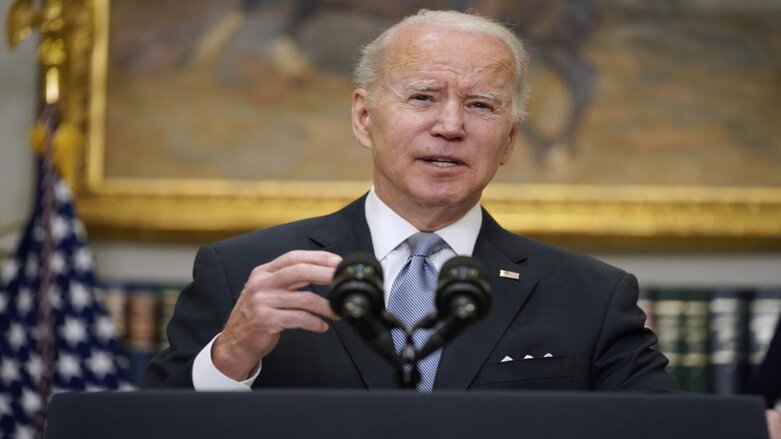Biden announces new military aid for Ukraine

WASHINGTON DC (Kurdistan 24) – After meeting with Ukrainian Prime Minister Denys Shmyhal, US President Joe Biden announced on Thursday morning that the United States would provide another $800 million in military aid to Ukraine.
Shmyhal is visiting Washington. He met later on Thursday with Secretary of Defense Lloyd Austin and will meet with Secretary of State Antony Blinken on Friday.
The new US weapons shipment is geared toward supporting Ukraine’s military capabilities in the east, where Russia began a new offensive after it failed to capture the capital Kiev, its initial target.
Russian President Vladimir Putin believed that Kiev would fall in a matter of days. But as the two-month mark for the fighting approaches, it is quite clear that Putin was very misinformed.
New US Aid Package
“Today, I’m announcing another $800 million to further augment Ukraine’s ability to fight in the east—in the Donbas region,” Biden stated on Thursday. That brings total US military support since Russia’s Feb. 24 invasion of Ukraine to $3.4 billion.
The Donbas is flat, open terrain that places a premium on long-range, precise fires, which are particularly effective in such territory.
Thus, the new US package includes 72 155 mm howitzers and the vehicles to tow them, along with 144,000 rounds of ammunition. That marks “a significant increase” over the previous US military aid package announced earlier this month, which, for the first time, included the long-range howitzers—but only 18 of them, as The Washington Post noted.
The new US military aid package also includes over 120 Phoenix Ghost drones, which were developed by the US Air Force and are similar to the “Switchblade” drones, 100 of which were sent in the previous military aid package.
Russia has responded to the military support coming from the US and other countries with threats, either explicit or implicit. Most recently, Russia tested a new intercontinental ballistic missile (ICBM). Putin used the occasion to affirm that the new missile “will make those who, in the frenzy of rabid and aggressive rhetoric, are trying to threaten our country, think twice.”
Read More: Putin threatens with new missile launch, but US dismisses it as ordinary test
Some figures in the Biden administration have a “growing concern” that “Russia is so isolated from the rest of the world that [Putin] sees little downside to provocative actions,” The New York Times reported on Thursday.
Yet such thinking is a recipe for a failed effort to achieve a near-impossible balance—which The Wall Street Journal has criticized on its editorial page and The Washington Post has cited in news reports.
It is unwarranted to assume that it is possible to define a set of US and European measures against Russia that would be strong enough to force Putin to reverse course, end the conflict, and withdraw—while not so strong as to cause him to undertake risky and aggressive moves beyond Ukraine.
Such a balance is impossible, and efforts to achieve it are the basis for the complaint of some critics who fear “provoking” Putin is still causing Washington and its European allies to withhold more advanced weapons from Ukraine, which would be of great benefit to the embattled country.
Moreover, it assumes that Putin will, otherwise, keep the conflict confined to Ukraine. But why should he? There are already indications that the Ukraine crisis is emboldening two of Russia’s allies in the Middle East, namely Syria and Iran.
Read More: Ukraine Crisis: Implications for the Middle East, including the US, Rojava, and the Kurdistan Region
Americans Support Biden’s anti-Russian Measures
The Biden administration has made clear that it will not send US forces to fight in Ukraine, and it is not really an issue that is being seriously discussed. However, there is widespread support for the measures that the administration has taken in support of Kiev. Indeed, if anything, Americans want to see more.
A poll conducted jointly by The Associated Press and the NORC Center for Public Affairs of the University of Chicago found that 54% of Americans think Biden has been “not tough enough” in responding to Russia’s assault on Ukraine. Thirty-six percent say his approach has been about right, while only 8% say he has been too tough. A majority supports his decision not to send US forces, as AP reported on Thursday.
The latest US military support package exhausts Congress’s initial allocation of weapons for Ukraine, which it approved last month. In his announcement on Thursday of the new US aid package, Biden pledged yet more support as he explained that he would be returning to Congress next week to make that request. Given how the US public views Russian actions in Ukraine, Congress will most likely approve the request.